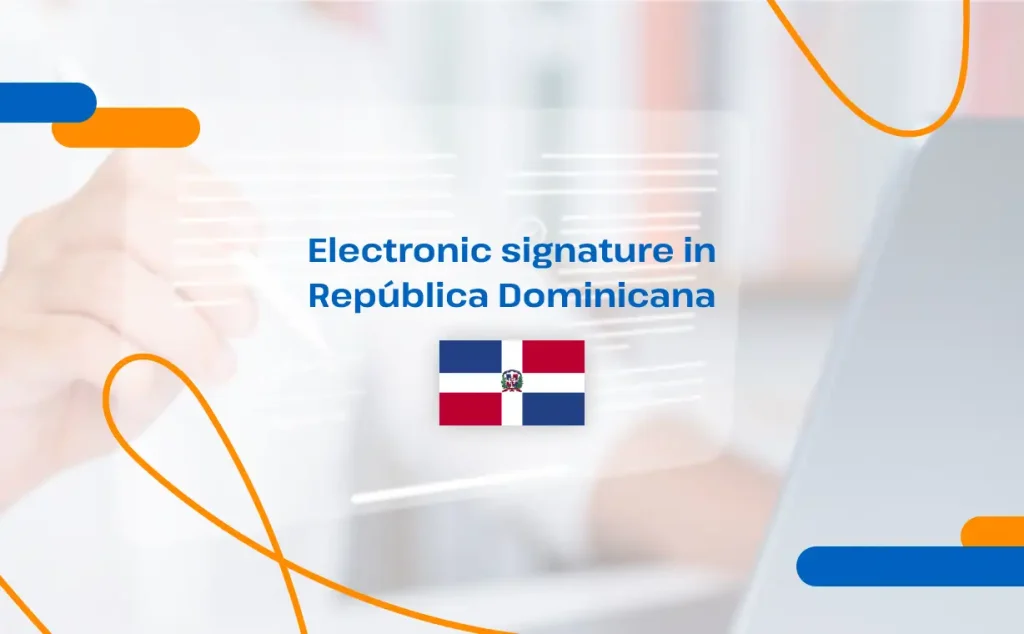 Updated in March 2024
Updated in March 2024
The Dominican law that regulates electronic signatures in the Dominican Republic is Law 126-02 on Electronic Commerce, Documents and Digital Signatures, of 14 August 2002, and its Implementing Regulations (Electronic Commerce Law).
The law defines the following concepts:
- Digital Signature: “A numerical value which is attached to a data message and which, using a known mathematical procedure, linked to the originator’s key and the message text, makes it possible to determine that this value has been obtained exclusively with the originator’s key and the message text, and that the initial message has not been modified after the transmission has taken place“.
- Electronic signature: “A set of integrated electronic data, linked or logically associated with other electronic data, which by agreement between the parties is used as a means of identification between the sender and the recipient of a data message or a digital document and which lacks any of the legal requirements to be considered a digital signature“.
- Digital Certificate: “Digital document issued and digitally signed by a certification authority, which uniquely identifies a subscriber during the period of validity of the certificate, and which constitutes proof that said subscriber is the source or originator of the content of a digital document or data message that incorporates its associated certificate“.
It equates the Digital Signature to the handwritten signature as long as it meets all the requirements set out in Article 31 of the law, i.e:
- Be unique to the person wearing it;
- It is under the sole control of the person using it;
- Is linked to the information, digital document or message, such that if these are changed, the digital signature is invalidated, and
- This is in accordance with the regulations adopted by the executive branch.
In the Dominican Republic, contracts by electronic means can use electronic or digital signatures, allowing in turn to identify and link a person with the creation of a data message, an act or a contract and that it has his or her approval. 
Certification Entities, issuers of digital certificates
The regulatory body is the Dominican Telecommunications Institute (INDOTEL), which has the authority to authorise the provision of digital signature certification services by authorising Certification Entities.
| The first Certification Entity approved by Indotel for the Dominican Republic was AVANSI on 28 September 2006 (Resolution Nº 166-06). |
As a Certification Authority, AVANSI is authorised to provide the following services related to digital signatures:
- Services for the issuance, administration, registration and preservation of digital certificates.
- Registration Unit Services.
- Verification of the identity or other information of applicants considered relevant for identity verification procedures.
- Registration of submissions and formalities submitted to them.
- Delegation of operations to other Registry Units.
- Other services or activities related to the Registration Units to be determined by INDOTEL.
- Registration Unit Services.
Developments in the legislative framework on electronic signatures in the Dominican Republic
In the regulations of INDOTEL, the regulatory body in the Dominican Republic, the terminology is modified with respect to the framework law (126-02). The main differences in terminology are as follows:
- Mientras que en la Ley 126-02 se habla de ‘Firma Electrónica’, en la resolución 017-19 hablamos de ‘Firma Electrónica Simple (FES)’.
- El concepto ‘Firma Digital’ pasa a ser ‘Firma Electrónica Avanzada (FEA)‘.
- Finalmente, el término ‘Firma Digital Segura’ pasa a conocerse como ‘Firma Electrónica Cualificada (FEC)’. Este tipo de firma tiene equivalencia a la firma manuscrita.
However, Resolution 071-19 also complements Law 126-02 and establishes equivalences with international regulations, such as the European ones. It seeks to adapt Dominican legislation to more advanced digital signature standards. In addition, it introduces the following novelties:
- Elimina los certificados de Persona Jurídica. Ahora, son considerados certificados de Sello Electrónico (eSeal).En ellos ya no aparecen los datos personales del representante legal de la compañía, sino solo los datos de la compañía en sí (RNC y razón social).
- Introduce el concepto de Identificación electrónica (eID). Ahora, es posible emitir el certificado a través de una verificación de la identidad de manera remota. Anteriormente, para emitir un certificado era necesario comprobar en físico que la persona existía.
Viafirma, your electronic signature solution
If you are looking for a document signature solution in Dominican Republic, Viafirma has the solution that adapts to your needs.
Contact us and we will inform you about our products and electronic signature solutions.